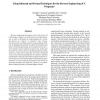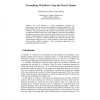107 search results - page 8 / 22 » Formal verification at higher levels of abstraction |
105
click to vote
ICSM
1996
IEEE
15 years 5 months ago
1996
IEEE
Reverse engineering of program code is the process of constructing a higher level abstraction of an implementation in order to facilitate the understanding of a system that may be...
DEXA
2000
Springer
15 years 5 months ago
2000
Springer
The event calculus is a logic programming formalism for representing events and their effects especially in database applications. This paper presents the use of the event calculus...
108
click to vote
FMCAD
2007
Springer
15 years 5 months ago
2007
Springer
Modeling hardware through atomic guard/action transitions with interleaving semantics is popular, owing to the conceptual clarity of modeling and verifying the high level behavior ...
121
click to vote
ICST
2009
IEEE
14 years 11 months ago
2009
IEEE
A software development process is conceptually an abstract form of model transformation, starting from an enduser model of requirements, through to a system model for which code c...
125
click to vote
NDDL
2003
15 years 2 months ago
2003
Data races are a common problem in concurrent and multi-threaded programming. They are hard to detect without proper tool support. Despite the successful application of these tools...


